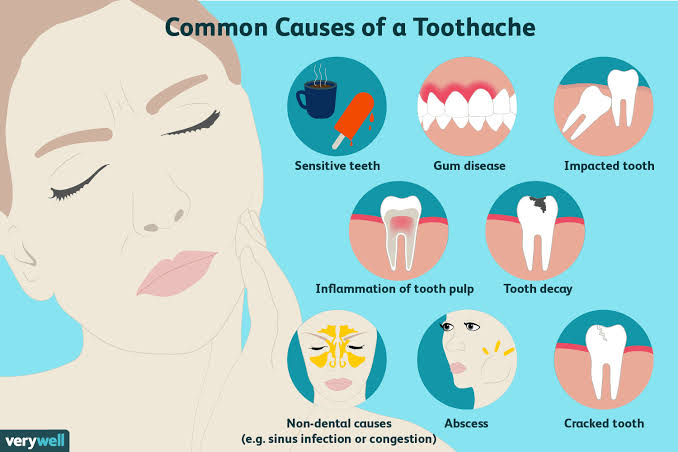
According to clevelandclinic.com, the pulp inside your teeth is a soft substance full of nerves, tissues, and blood vessels. The pulp nerves are among the most sensitive nerves in your body. When these nerves become irritated or infected with bacteria (abscess), it can cause severe pain.
What are the possible causes of a toothache?
-tooth decay .
Tooth abscess (a bacterial infection inside the center of the tooth).
Tooth fracture (tooth fracture).
Damaged filling.
Repetitive motions, such as chewing gum, grinding or gnashing your teeth, these motions can damage your teeth.
Infected gums.
Eruption (teeth coming out of the gums) or extraction of a tooth (such as a wisdom tooth).
What are the symptoms of a toothache?
– Toothache that may be sharp, pulsating, or continuous, and in some people, pain is produced only when pressing on the tooth (biting something).
Swelling around the tooth.
Fever or headache.
Foul-tasting discharge from the affected tooth.
Bad smell from the mouth.
If you experience difficulty breathing and swallowing along with the pain, contact your dentist immediately.
Some toothaches caused by the pain (but not from the inside) can improve without the need to visit the dentist. The pain caused by temporary irritation (redness) in the gums can go away within a few days. During this time, try not to chew the affected area. And eat soft foods, such as eggs and yogurt, and avoid sweets and very hot or very cold foods if the teeth are sensitive.
How do I treat a toothache at home?
For temporary relief of a toothache, you can do the following:
Rinse with warm salt water. Salt water can loosen debris between your teeth, acting as an antiseptic and reducing inflammation.
– cold compress. For swelling and pain, apply an ice cold compress wrapped in a towel to the painful area for 20 minutes. Repeat every few hours.
Pain medications. Over-the-counter pain relievers can reduce pain and inflammation. Non-steroidal anti-inflammatory drugs may be used.
Natural or herbal remedies
Clove oil. A natural antiseptic that numbs pain and reduces inflammation. Squeeze a small amount of clove oil onto a cotton ball and apply it to the painful area, or add a drop of clove oil to a small cup of water and rinse your mouth well.
Vanilla extract. The alcohol in the vanilla extract temporarily numbs the pain, and the antioxidants in it help the area heal. Use your fingertips or a cotton ball to apply the extract to the tooth and gums several times a day.
Peppermint tea, the soothing properties of mint can be applied to the painful area using a cooled mint tea bag. Place the warm tea bag on the teeth and gums.
Garlic, make a paste from a crushed garlic clove and apply it on the affected area, garlic can kill bacteria (it contains the antimicrobial allicin) and relieve pain






